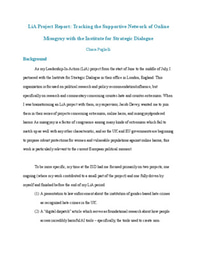End of Programme Reflection
I think that the Laidlaw Scholars program at the University of Toronto has been the single most transformative endeavour that I have ever embarked on. When I first applied, I knew that I had passion and some of the qualifications to do something great with said passion – I have always been interested in political extremism and in studying it from multiple perspectives (philosophical, policy-focused, etc.) – however, I didn’t know how to apply it. I used to say I had “undergraduate disease”; symptoms include: never feeling at home in a professional space because you don’t think you should be there, always feeling as though your age makes you feel blind to the possibility that your ideas have been said before (so why write them at all), and never thinking your work could be sophisticated enough for someone to care about. Nonetheless, friends had convinced me to apply anyway with my idea of clarifying the definition of fascism through philosophical analysis.
How fun my first research summer was turned out to be my first surprise of the program. In the past, I have been frustrated with the limitations that come along with working within others’ guidelines, such as assignment guidelines that require me to only look at an issue from one particular lens. As it turns out, getting greater freedom to direct my own project allowed me to harness my abilities of self-direction and time management that I already had! As well, getting to meet a whole cohort of other people at UofT who shared the same levels of passion for their own work and the same self-drive was a truly great motivation to consider my work as valuable; because, if I am so impressed by the work of all these other undergraduates, then maybe “undergraduate disease” is not as real or as intrinsic to my age group as I thought. As such, the first summer and the leadership sessions provided great developments for my individual confidence.
As for the element of global experience that is inherent within the program, I would say that the trip from Toronto to New York for the Annual conference was a great starting point for developing my confidence travelling to different places. As someone born in Toronto whose family doesn’t travel very often, I was very nervous to go to different places at all for fear of being “out of my element” or unable to grasp local culture. The opportunity for a mini-trip to the conference (prior to the looming larger trip that was to be my LiA) was so helpful in building my comfort with being in entirely new cities. As such, when I landed in London for my LiA, I felt as though I understood being without my family in a new city a bit better than if I hadn’t gone to New York City.
The Oxford Character Project was unfortunately difficult for me to engage with. I work very well in-person, and felt as though the app-based character trait building did very little for actually helping me engage with the elements of my character beyond the hour-long lecture. I did have fun during the moments I could chat with other Laidlaw scholars across the many universities involved, but I feel as though the project didn’t reach my way of learning or thinking more broadly.
I felt that the preparation for cultural immersion provided in the leadership sessions helped so much in creating greater ease in fitting into London during my LiA. I felt incredibly comfortable asking questions of my colleagues, new friends, and even just people around London simply because we had been prepared to empathize with the host city’s culture in those culture-focused leadership sessions.
In London, I feel as though the LiA experience gave me the final push to expel “undergraduate disease” from my mind. My organization treated me and my ideas as equal to and as worthy of consideration as even the most experienced people in the organization, which was incredibly surprising at first, but felt more comfortable after a few weeks with the organization. I feel as though gaining that experience through the LiA work gave me truly transferable skills in digital analysis and report writing that I can carry on to future careers. My time in London made a career outside of Canada feel a lot more possible to a now-less-sheltered person like me, and it has motivated me to think globally when I think about my policy interests and what I wish to research in the future.



Please sign in
If you are a registered user on Laidlaw Scholars Network, please sign in